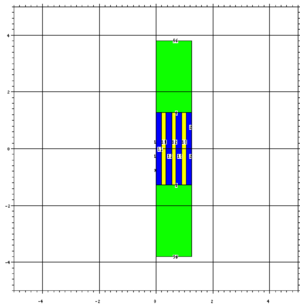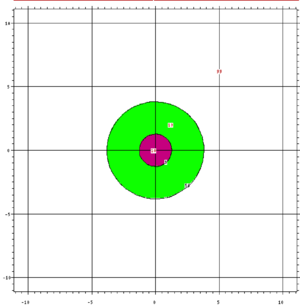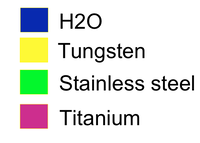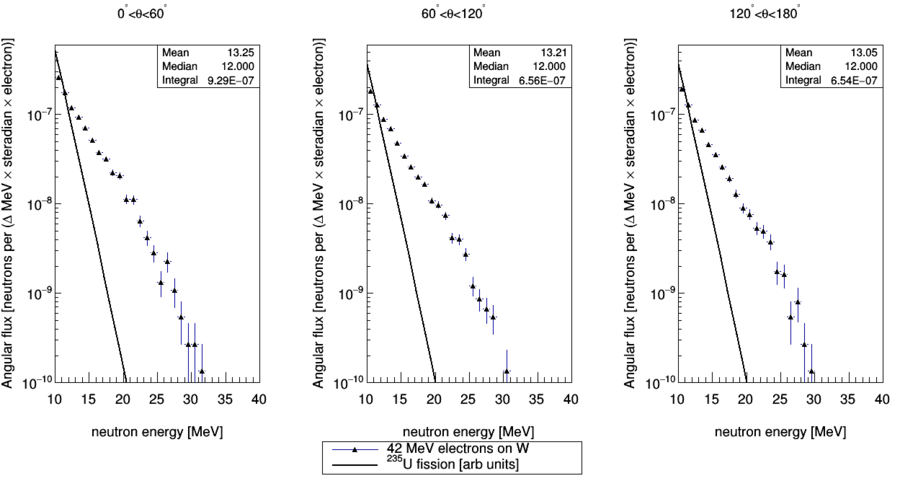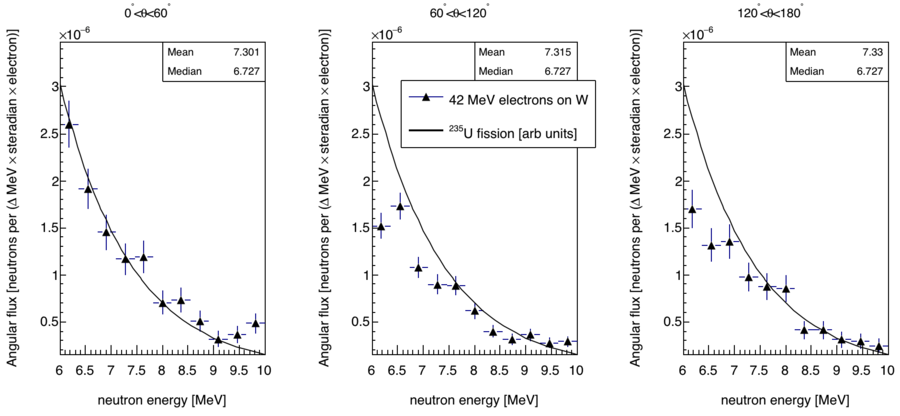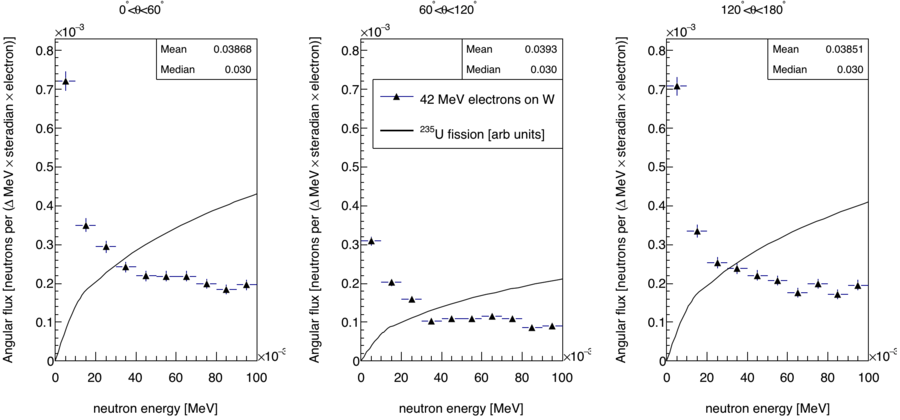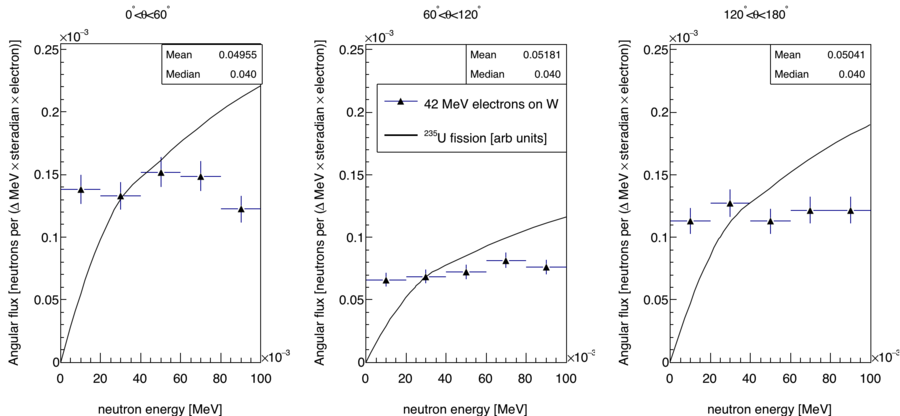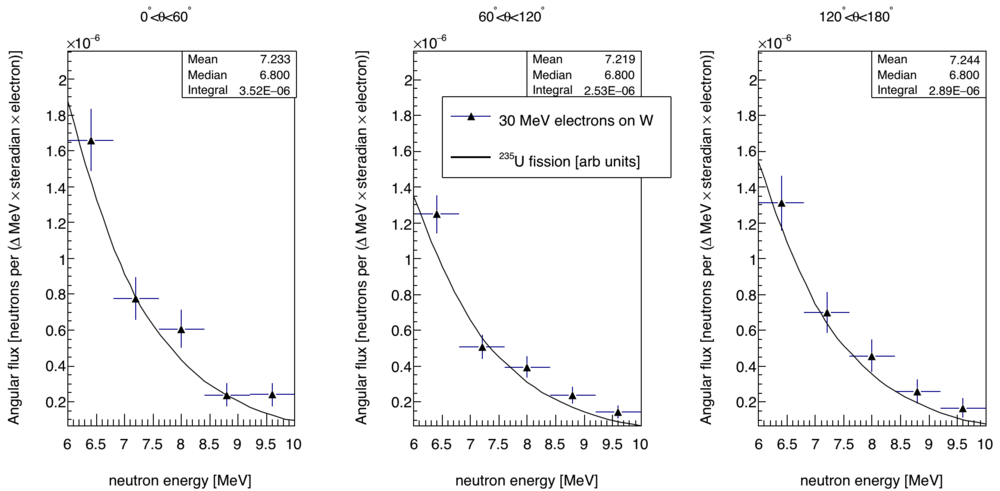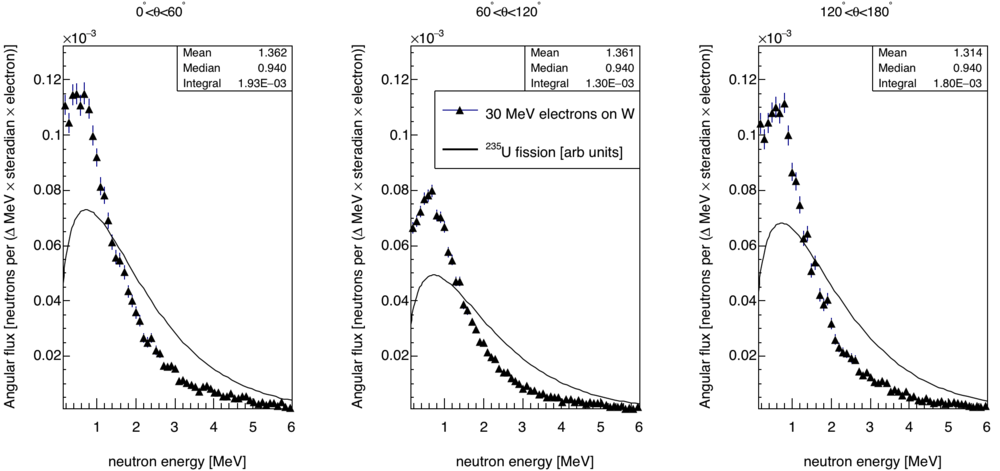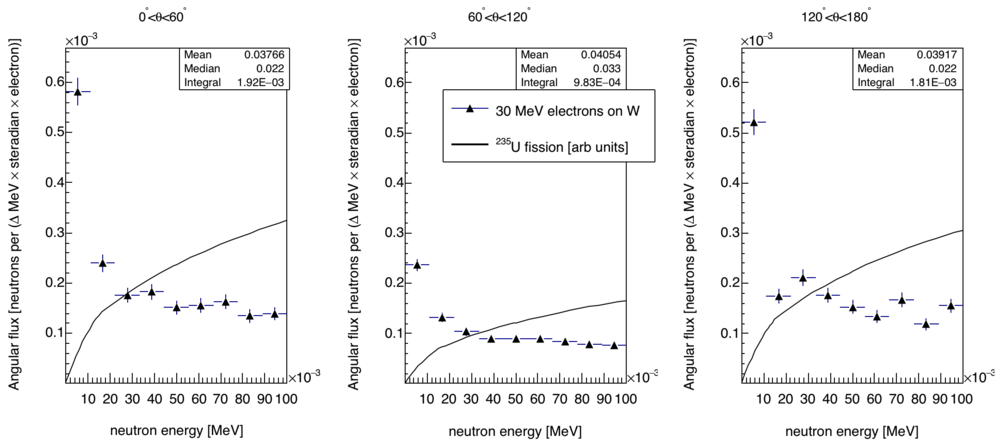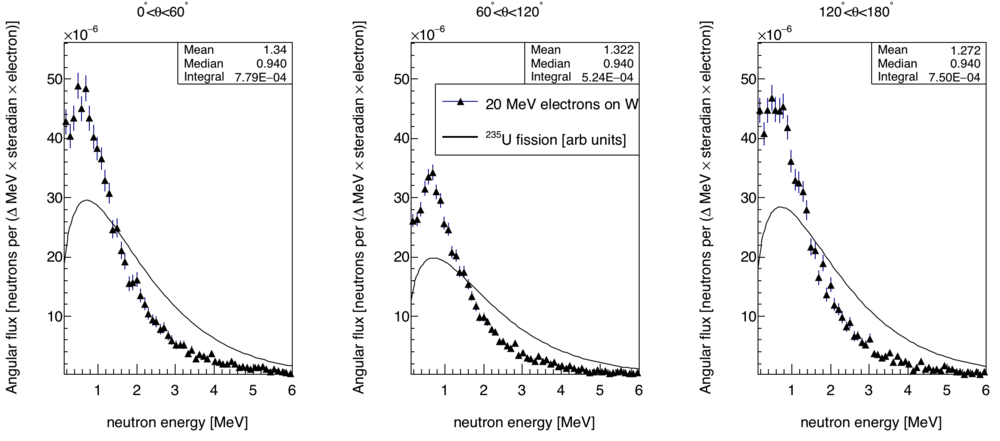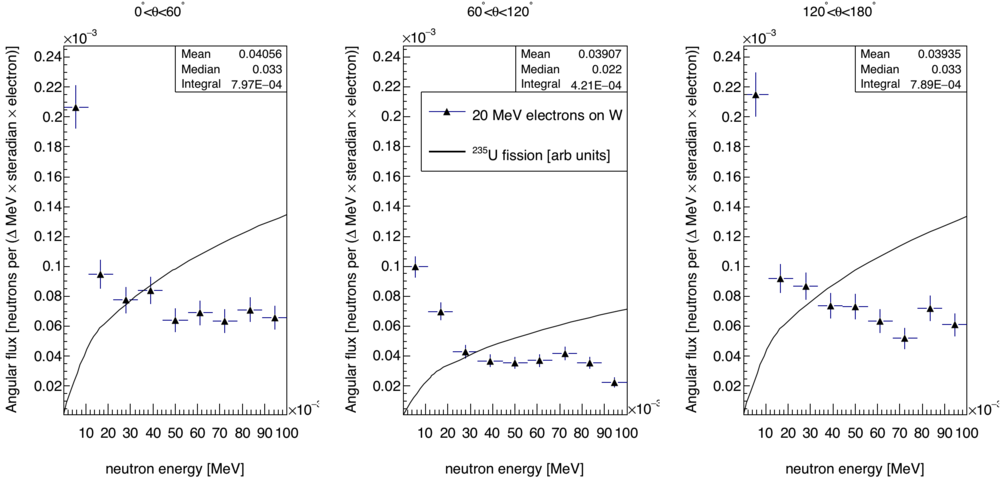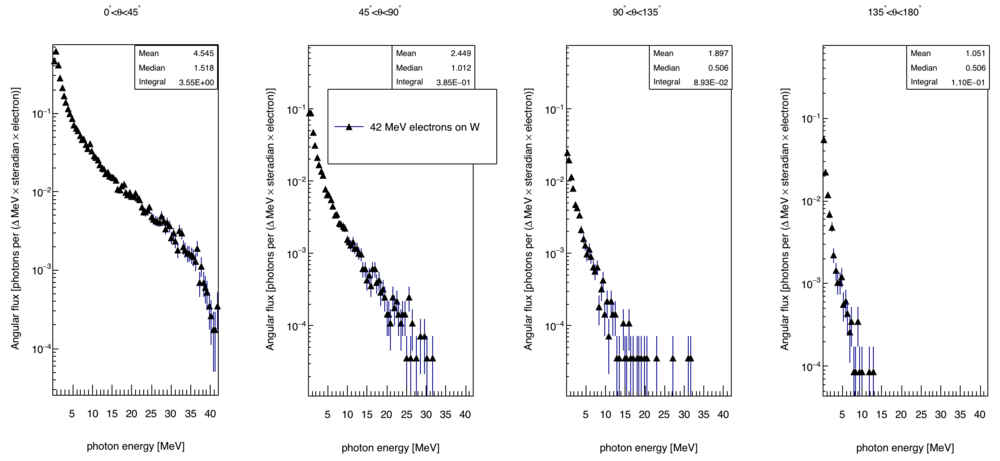Difference between revisions of "MCNP Sim of Jack Converter"
(→misc) |
|||
| (63 intermediate revisions by the same user not shown) | |||
| Line 1: | Line 1: | ||
=Simulation inputs= | =Simulation inputs= | ||
| + | MCNP input deck: [[File:MCNP Jack Converter.txt]]. | ||
| + | |||
| + | The cross-section plots below show that the vast majority photo-neutrons are produced by (G,n) on Tungsten-184. | ||
| + | |||
| + | [[File:Wxs(Fiss,1n).png | 600px]] | ||
==Geometry== | ==Geometry== | ||
| − | [[File:JackSimGeomFront.png | 300px |left|top| thumb| | + | [[File:JackSimGeomFront.png | 300px |left|top| thumb| Profile view of converter geometry. Distances are in cm. There are two thin (0.001 inch) titanium plates, one on the far left and another on the far right of the convertor, but they are too small to be seen in this diagram. 0.2 cm of water separates each of the three 0.15 cm thick tungsten plates.]] |
| + | [[File:JackSimGeomProfile.png | 300 px|right|top|thumb| Front view of convertor geometry. Distances are in cm. ]] | ||
| + | |||
| + | '''Materials legend for figures:''' | ||
| + | |||
| + | [[File:JackSimMCNPLegend.png || 200px]] | ||
| + | |||
| + | |||
| + | |||
| + | |||
| + | |||
| − | |||
| − | |||
| − | |||
| − | |||
| − | |||
| − | |||
| − | |||
| − | |||
| Line 26: | Line 33: | ||
. | . | ||
| + | ==Assumptions== | ||
| + | The beam spot size was given a diameter of 0.5 based off of the size of a burn mark on a converter that got hot during irradiation. | ||
| + | Electrons are mono energetic. | ||
=Results= | =Results= | ||
| − | + | The plots below show the energy distribution for neutrons exiting the converter at three different intervals of their angle w.r.t. the incident electron beam. | |
| − | The | + | The energy spectrum of neutrons from the neutron-induced fission of U235 is shown on each plot, and is normalized to have the same integral flux as the simulated neutrons to facilitate comparison. |
| − | The | + | |
| − | [[File: | + | The mean and median energy of fission neutrons from U235 is 1.94 MeV and 1.66 MeV, respectively. The mean and median energy of produced neurons are also shown on each plot. |
| + | |||
| + | ==Neutron energy spectra from 42 MeV electrons== | ||
| + | === 10 - 42 MeV neutrons=== | ||
| + | [[File:JacknConvertorSimHighErgNeutrons.png|900px]] | ||
| + | |||
| + | === 6-10 MeV neutrons=== | ||
| + | With water in the converter (no significant difference with no water): | ||
| + | |||
| + | [[File:42MeVJackLin n(high erg).png|900px]] | ||
| + | |||
| + | ===0.13-6 MeV neutrons=== | ||
| + | With water in the converter (no significant difference with no water): | ||
| + | [[File:42MeVJackLin n-0.13(water).png|1000px]] | ||
| + | |||
| + | ===0-0.1 MeV neutrons, with and without water=== | ||
| + | With water: | ||
| + | |||
| + | [[File:42MeVJackLin n thermal(water).png|900px]] | ||
| + | |||
| + | Without water: | ||
| + | |||
| + | [[File:42MeVJackLin n thermal(nowater).png|900px]] | ||
| + | |||
| + | ==Neutron energy spectra from 30 MeV electrons== | ||
| + | === 6-10 MeV neutrons === | ||
| + | [[File:30MeVJackLin n(high erg).png|1000px]] | ||
| + | |||
| + | ===0.13-7 MeV neutrons=== | ||
| + | [[File:30MeVJackLin n-0.13.png|1000px]] | ||
| + | |||
| + | ===0-0.1 MeV neutrons === | ||
| + | With water: | ||
| + | [[File:30MeVJackLin n thermal(water).png| 1000px ]] | ||
| + | |||
| + | ==Neutron energy spectra from 20 MeV electrons== | ||
| + | === 6-10 MeV neutrons === | ||
| + | Not enough statistics. | ||
| + | |||
| + | ===0.13-6 MeV neutrons=== | ||
| + | [[File:20MeVJackLin n-0.13.png|1000px]] | ||
| − | == | + | ===0-0.1 MeV neutrons === |
| − | + | with water: | |
| + | [[File:20MeVJackLin n thermal(water).png|1000px]] | ||
| − | + | ==Photon energy spectra from 42 MeV electrons== | |
| + | The plot below shows the energy distribution of photons exiting the converter for four different ranges of angle w.r.t. the incident electron beam | ||
| − | + | [[File:42MeVJack photons.png | 1000 px]] | |
| − | |||
Latest revision as of 20:26, 25 September 2018
Simulation inputs
MCNP input deck: File:MCNP Jack Converter.txt.
The cross-section plots below show that the vast majority photo-neutrons are produced by (G,n) on Tungsten-184.
Geometry
Materials legend for figures:
.
Assumptions
The beam spot size was given a diameter of 0.5 based off of the size of a burn mark on a converter that got hot during irradiation. Electrons are mono energetic.
Results
The plots below show the energy distribution for neutrons exiting the converter at three different intervals of their angle w.r.t. the incident electron beam. The energy spectrum of neutrons from the neutron-induced fission of U235 is shown on each plot, and is normalized to have the same integral flux as the simulated neutrons to facilitate comparison.
The mean and median energy of fission neutrons from U235 is 1.94 MeV and 1.66 MeV, respectively. The mean and median energy of produced neurons are also shown on each plot.
Neutron energy spectra from 42 MeV electrons
10 - 42 MeV neutrons
6-10 MeV neutrons
With water in the converter (no significant difference with no water):
0.13-6 MeV neutrons
With water in the converter (no significant difference with no water):
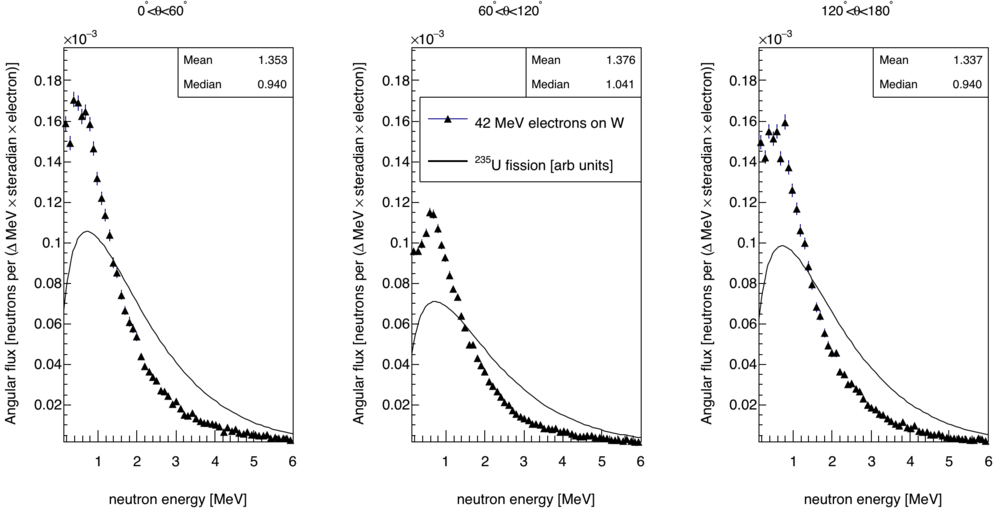
0-0.1 MeV neutrons, with and without water
With water:
Without water:
Neutron energy spectra from 30 MeV electrons
6-10 MeV neutrons
0.13-7 MeV neutrons
0-0.1 MeV neutrons
Neutron energy spectra from 20 MeV electrons
6-10 MeV neutrons
Not enough statistics.
0.13-6 MeV neutrons
0-0.1 MeV neutrons
Photon energy spectra from 42 MeV electrons
The plot below shows the energy distribution of photons exiting the converter for four different ranges of angle w.r.t. the incident electron beam

